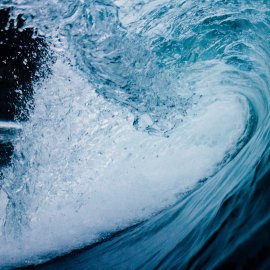Hydrospace
-
English
-
ListenPause
[intro music]
Welcome to World Ocean Radio…
I’m Peter Neill, Director of the World Ocean Observatory.
Listeners to World Ocean Radio will know my definition of the ocean as a continuum, from freshwater to salt, from mountain-top to abyssal plain. That perspective was oddly unique for a while, seen as an outlier point of view that contradicted the conventional structure of science and governance that separated the two contiguous systems and pursued bifurcated research and policies, a phenomenon that, while changing, still remains. It has been the source of 16 years of frustration for me as an ocean advocate, has determined the content and organization of the World Ocean Observatory, and has relentlessly motivated me to repeat, and repeat again, the inaccuracy and failure of this false dichotomy.
We study the ocean today through the prisms of scientific categories: physics, chemistry, biology, geology, bathymetry, meteorology, and each discipline has its distinguished researchers, academic departments, professional publications, conferences, and network of collaborators, all diving deep into a singular aspect of the ocean, horizontally through volumetric exchange and conveyance, and vertically up and down the water column. Only recently has there emerged crossover and exchange of data between disciplines and integrated studies that begin to present and understand the synergy of systems and explanations derived, even as the underlying method is the efficiency of new technology and the exploitation of exponential volumes of data.
Hydrology is a case in point, defined by the International Hydrographic Organization (IHO) https://iho.int/ as “the branch of applied science which deals with the measurement and description of the physical features of oceans, seas, coastal areas, land and rivers, as well as with the prediction of their change over time…” What has emerged from within this community is a new perspective, “hydrospatial” being the descriptive adjective, information systems combined to produce multi-dimensional analyses and visualizations for planning and decision-making that break down the artificial disciplinary boundaries of science to allow for comprehensive inclusion of multiple perspectives to better inform understanding of complex ocean systems to inform international goals and objectives such as the UN Sustainable Development Goals that pertain not just to the ocean and life below water, but also to fisheries and freshwater issues, waterways and transportation, hunger, health, work and economic growth, industry, innovation, and infrastructure, and sustainable cities and communities – all outcomes that rely on this more comprehensive and fully charted understanding of how the ocean relates to every aspect of life on earth.
When we talk about the so-called blue economy, we are talking about this very thing, about how the ocean drives the primary systems of life as expressed by the inter-relationship of value as provided by natural systems. Economics is defined as “the branch of knowledge concerned with the production, consumption, and transfer of wealth.” While there are various theories and practices for how an economy works, the knowledge applied directs what we produce, what we consume, and what we regard and transfer as wealth. It is fundamentally a value equation. The sciences inform those theories and practices; they are the building blocks of the knowledge required to make the systems of life support, successfully, our systems of living.
We live in “hydrospace.” That realization informs our future. We live in a “hydraulic society,” where the integration and sustainability of the ocean/freshwater continuum will enable our future. Finally, science and governance are beginning to understand and to work in complement to that fundamental synthesis in Nature. Listeners to World Ocean Radio may hear in my voice, in my description of this change, some tremors of hope, some sense of an opening, at last, to a forward perspective that will transform ways of life, understanding of the earth around us, and prospects for generations, now and to come.
We will discuss these issues, and more, in future editions of World Ocean Radio.
[outro music]
This week on World Ocean Radio we are discussing hydrology, the "hydrospatial" perspective, and the importance of multi-dimensional analyses and visualizations for planning and decision-making that break down the artificial disciplinary boundaries of science to allow for comprehensive inclusion of multiple perspectives and better understanding of complex ocean systems for international goals and objectives.
About World Ocean Radio
Peter Neill, Director of the World Ocean Observatory and host of World Ocean Radio, provides coverage of a broad spectrum of ocean issues from science and education to advocacy and exemplary projects. World Ocean Radio, a project of the World Ocean Observatory, is a weekly series of five-minute audio essays available for syndicated use at no cost by college and community radio stations worldwide.
Image
@timmarshall via Unsplash
- Login to post comments



